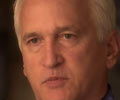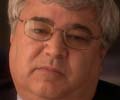- Highlights
- "Mr. Outsider"
- "The Keating Five" scandal
- Being wooed by the Democrats
- The dustup with Sen. Obama
- People
- Victoria Clarke
- Mark Salter
- William Cohen
- Robert Timberg
- Jerry Kammer
- John Weaver
- Tom Daschle
- Pete Rouse
- Jeff Zeleny
- Related Link
- After 2000 Run, McCain Learned to Work the Levers of Power
A New York Times profile of McCain's "political reinvention" as the Senate's "most influential member."
"Mr. Outsider"
Victoria Clarke Former McCain press secretary, 1983-'89

When he first comes as a congressman, how do people view him?
He surprised them. Most people, even those who knew him, thought, "Well, he's going to immediately start charting his course on defense matters." And he didn't. He proved to be more careful than people expected. ...
He didn't want to play into people's assumptions that he's going to try to be the leader of the pack right away, that he's going to try to use the influence he had from the time he spent [as a Navy Senate liaison] on the Senate side.
He was very careful, kept his head down, worked hard, took a lot of advice from smart people like [Sen.] Mo Udall [D-Ariz.]. [Sen.] Barry Goldwater [R-Ariz.] at the time was the dean of the Arizona delegation, but in many ways Mo Udall really was the leader. And he took a lot of advice from Mo Udall: work hard, keep your nose clean, be respectful of your colleagues, you'll be just fine.
Mark Salter Senior adviser to John McCain
 Read the full interview >
Read the full interview >
In the entire McCain political history, the influence of Mo Udall is sometimes overlooked, but it was a profound influence on him. You can see what he took from his relationship with Mo Udall in his relationships with people like [Sen.] Russ Feingold [D-Wis.]. Very often, we'll see an incoming freshman senator, and McCain will make the first move to -- "I'd like to work with you on this or that." That he learned from Mo Udall. ...
And what is the meaning of that relationship for the John McCain who aspires to the White House now?
Oh, I think it's clear. You can see its reflection in John's relationship with Russ Feingold. Together he and Sen. Feingold worked to reform the way we finance political campaigns in the country. And I think what Mo taught him was, you don't have to abandon any principles to work with people of the other party to solve problems important to the country. ...
People also forget that he had exposure to the Senate before he was ever elected to it, at a time where reflexive partisanship in the body hadn't become quite as acute as it is today. He was the Navy Senate liaison, and he got to know lots of members quite well. He was very close friends with [Sen.] Gary Hart [D-Colo.], with [Sen.] Bill Cohen [R-Maine].
William Cohen Former senator, 1978-'97 (R-Maine)

[When he got to Congress] is he the kind of guy that people like right away?
I think being liked, that's key in politics. You can be the brightest politician in the world, [but] if people don't like you, they won't listen to you. And so likeability is a major factor, and with John, it was natural. You're going to like him the moment you meet him. And you may come to disagree with some of his positions, but you're still going to like him. ...
... What about the anger thing? Did you witness it?
Has he got a temper? Sure. Every one of us have a temper. Does he keep it under control? Most of the time the answer is he does. But yeah, he's got something of a temper. I think he'd be the first to tell you that. Is it something that in any way would inhibit him from carrying out his duty? I don't think so.
Why do you figure only four United States senators supported him [in his presidential bid] in 2000? Some people say "Nobody really likes John McCain in the Senate." Is that your sense of it?
I don't think that's true. I think that the issue -- when John was taking on campaign financing, for example, I think that many of his colleagues saw that as undercutting their ability to raise the kind of funds that they needed. So I think a number of them took that personally. It wasn't that they didn't like John McCain; they didn't like the fact that he was taking on that issue. ... So I think that there's that element that he's prepared to do things that are not part of the club, and that sets him something outside the club.
And I know that he would take on the issue of pork-barrel spending. Now, one man's pork is another man's livelihood over here, and that cuts, again, [were] central to many of the members' political self-interest. John was willing to take that on. Those are things which don't necessarily endear you to your colleagues.
Robert Timberg Author, John McCain: An American Odyssey and The Nightingale's Song

[Sen. McCain] feels like you join a political party because, on most things, the members of that party believe as you believe. I don't think he ever saw that as meaning that you had to remain in lockstep on every issue. I think when he first was elected to Congress, he always felt that when he needed to, he would go his own way. Certainly with McCain-Feingold, the campaign finance reform bill, he did. ...
... He seemed to make his bread and butter there for awhile as being Mr. Outsider, though.
... I think he thinks that's what a senator does: You see what needs to be done, and you try to do it or make it happen. ... One of these other things that Republicans get all exercised about with McCain is that he crosses over the aisle. He'll sponsor legislation with Feingold or with Ted Kennedy or with, god forbid, Hillary Clinton. ...
Every election I could remember, the candidates would be saying that they're going to end the gridlock in Washington. Well, if you're not going to reach across the aisle, how the heck are you going to end the gridlock? ... I just find that bizarre that that's viewed as somehow a flaw. I believe it's called bipartisanship.
"The Keating Five" Scandal
Jerry Kammer Reporter, The Arizona Republic

Congress deregulated the savings and loan industry in 1982 -- opening up an industry which had previously been limited to financing home mortgages, the American dream -- on the basis of the claims by the savings and loan industry that they needed more opportunities to invest their federally insured deposits. ...
That deregulation invited into the industry a new breed of high rollers, including people like Charlie Keating, some of whom were reckless and irresponsible and who built their S&Ls by bringing in large numbers of broker deposits at $100,000 dollars a clip. And they accumulated billions of dollars which they invested often recklessly, and sometimes fraudulently, as was the case with Keating.
So when do McCain and the other Keating Five [senators] get involved with Charles Keating? And what do they do?
In 1987, Keating was engaged in a war with the federal regulators ... who looked at his investment portfolio, examined his books and were astonished and alarmed and horrified at the way he was throwing around his money. ... And Keating, having donated more than $1 million dollars to these five senators, ... called upon them and asked them to intervene with the regulators on his behalf. They did, in a couple of meetings in the spring of 1987, and thereafter those senators became known as the Keating Five. ...
... Did Keating have a personal relationship with any of the senators?
His closest personal relationship was with John McCain. Keating and McCain vacationed frequently. ... And Cindy McCain and Cindy's father had a major participation in a shopping center that Keating built.
... As we began working on this story, my partner Andy [Hall] got a tip that we should look into McCain's travels with Keating. When we asked McCain's office about what trips they had taken together, they then disclosed information which they had held back until that time, which showed that indeed they had taken at least nine trips together on Keating corporate aircraft, ... and that McCain had not disclosed those trips and had not reimbursed them as he should have.
Now, McCain claims that this was an innocent oversight, that it was just something that fell between the cracks. But in any case, this certainly showed that their relationship was far more than the senator-constituent relationship that Sen. McCain had claimed for a long, long time. And that was really the gist of our story.
... You mentioned that sometimes you called it "the Keating Three Plus Two." What did you mean by that?
It became very clear that Sens. McCain and [John] Glenn [D-Ohio] did not do anything of substantive value for Charlie Keating, in terms of pulling the regulators back.
Meanwhile, Sen. [Donald] Riegle [D-Mich.], and especially Sens. [Dennis] DeConcini [D-Ariz.] and [Alan] Cranston [D-Calif.] were jumping all over the regulators saying, "You've got to go easy on Charlie Keating." Their intervention was remarkably aggressive. ...
So what did John McCain learn from this? And what did he do in response?
He became an advocate for campaign finance. He saw how the system can be corrupting. He saw how the donor class doesn't donate because necessarily of their belief in good government; it's because they expect a return on their investment. And he saw how this can corrode our democracy and undermine the people's faith in their government.
Also, he developed this strategy with the press. Instead of meeting the press with a pitchfork at the door, he has a drink in his hand: "Come on in. Let's sit down and let's talk." He charmed the press. He disarmed the press in ways that I don't think are necessarily healthy for the relationship.
William Cohen Former senator, 1978-'97 (R-Maine)

Did he talk to you during the Keating Five times?
On a number of occasions on the Senate floor, Sen. [Warren] Rudman [R-N.H.] and I would meet with him over in the corner at his desk or our desk and we would just simply say, "Hang in there, this is going to turn out alright." But he was angry about it, really angry that he had been labeled one of the Keating Five and that they were holding him in because he was the only Republican. ... They were not going to cut him loose from that because they needed politically to say it was a bipartisan type of endeavor dealing with Keating. We had a number of discussions on that.
What did he want to do? How did he want to react?
I think he wanted to have it out in the open and get it over with, saying, "Let's get the facts out." But it kept going on for months. I think it was this slow twisting in the wind that really bothered him the most of all.
Victoria Clarke Former McCain press secretary, 1983-'89

Most of the Keating Five senators decided the way to deal with the scandal was to deal with it as little as possible: Leave it to the lawyers; leave it to the consultants; try not to be the one talking. John McCain said: "That approach just doesn't work for me. I think what I did was very different than some of these other guys. It's important for that to get out there. It's not my nature."
"From this day forward," he says, "we're going to take every interview that we can take. To start I want to have a press conference in Arizona. Everybody can come. I'll say what I have to say. And then I will take questions until they don't have anymore questions."
I just said: "I'm scared to death you'll lose your temper. It would be awful. That footage will be there forever." And he said, "Alright, here's what we do: You sit in the front row" -- normally press secretaries hide in the back. "If you think I'm starting to lose my temper, I want you to just put your finger like this on the side of your nose." But I never had to do it in the course of the press conference. ...
People have pointed to this moment as the beginning of the Straight Talk Express.
Absolutely. ... It was a very honest attempt to face up to mistakes, and you don't often see most people doing that. You certainly don't often see politicians doing that.
Robert Timberg Author, John McCain: An American Odyssey and The Nightingale's Song

One of the things I think is most fascinating about The Keating Five episode is how it affected Sen. McCain, not necessarily politically but personally and emotionally. I had gone through more than a year, maybe two years of interviewing him practically every week for about an hour at a time. And it was always fun. Even when we were in the darkest days of his time in prison, he would come up with some funny story that lightened the atmosphere. When Keating Five [came up], everything changed. It was like this shroud had dropped over McCain.
And I remember in one particular interview -- and something had happened that day; I don't know what, but he was really, really down. ... And he says, "This is the worst thing that ever happened to me."
I go, "What?" He said, "This is the worst thing that ever happened to me." And I said, "Well, you know, with all due respect, Senator, it's kind of hard to believe that." And he said, "No. This is worse." It was his honor that was being challenged. And you couldn't fake that.
John Weaver McCain chief political adviser, 1997-'07
 Read the full interview >
Read the full interview >
He admits that when his obituary is written, the Keating scandal will be somewhere high in it. So he understands the dark stain that that had on his career. But he grew from that. I think from that experience and those mistakes that he made, which he will readily admit to, came the reformer that we all know now; that John is, as far as campaign finance reform, taking on the special interests in Washington. So that was his pivot point to looking at how to change Washington.
That would not be the normal reaction of another politician that was involved in that situation.
No. Most would bunker in. I think that tells you about his curiosity and the fact that he is very optimistic, that he is very forward-looking.
Being wooed by the Democrats
John Weaver McCain chief political adviser, 1997-'07
 Read the full interview >
Read the full interview >
2001: McCain goes back to the Senate, seen as an outsider, even more so than before. He takes some very strong stands early on against the Bush taxes and stuff. What's going on at that point?
The backdrop was that we were in very icy relations with the White House. And when I say "icy," Siberia doesn't have that much ice. That would define the relationship between our world and the White House at that point in time.
John had campaigned [in 2000] on a whole host of issues, and, quite frankly, his tax cut plan, which would have been the largest tax cut in American history had it been implemented, also had enough money to pay for the privatization of Social Security and [to] leave money with the government in case of a foreign policy crisis. I think in hindsight we wish we had done that.
John did vote against the Bush tax cut. And meanwhile, we were pushing campaign finance reform, patients' bill of rights, a whole host of issues, I don't think it's feasible to say that once somebody does that, when they get back to the Senate, they have to drop their entire agenda.
Now, I'm sure the White House didn't see it that way. And I know that Republican leadership at the time -- [Miss. Sen.] Trent Lott and others -- didn't see it that way either.
So he lost the run for president, but did he see his role as being different now in the Senate?
He knew that he had a power base. And immediately after that election, outside of Colin Powell, who was secretary of state, McCain was the most popular political figure in the country. Any poll showed that he had tremendous support. He was almost a Good Housekeeping Seal of Approval on policy issues in the Congress.
He knew he had a tremendous asset then to try to get things done, and he was willing to use it. I know that he didn't think that he could ever run for president again, so it wasn't a matter of that. It was a matter trying to get some things done that he really cared about.
Now, the story much talked about of him joining the Democratic Caucus -- set us straight on that.
Being political people, we periodically would look at him running as an independent. But within an hour of a discussion, those things would be shelved, because it's not feasible with our current party structure for an independent to win. If you go back at that time period, the Democrats were just within one seat of taking control of the Senate. They were on a searching mission, trying to get anybody to switch. They were going to Sen. [Jim] Jeffords [of Vermont], Sen. [Lincoln] Chafee [of Rhode Island].
Sen. McCain received a phone call one day from Sen. Kennedy, who is a very good friend of his. Even though they have philosophical differences, they have tremendous respect for each other. And John had received the John F. Kennedy Profile in Courage Award.
Sen. Kennedy called John, asked him to come to a meeting in his office on an undetermined topic. He mentioned it to myself and to Mark Salter that he was going over there; didn't say what it was. When he got there, I believe there was Sen. [John] Edwards [of North Carolina], Sen. [Tom] Daschle [of South Dakota], who was the minority leader, Sen. Kennedy -- may have been a couple other senators -- and they made the full-court press, asking him to switch, become an independent. He could remain chairman of the Commerce Committee if he would do so. And he said no.
Now, I believe Sen. Daschle reached out to him a couple of more times on the Senate floor, and I think Sen. Kennedy reached out to him a few more times. But at no point do I think John ever seriously considered it.
Even though he understood that this was a powerful move to make and perhaps could have pushed forward his agenda --
At that point, he was being very successful in cobbling together bipartisan votes on his agenda. We passed patients' bill of rights out of the Senate, which had been stalled. We passed campaign finance reform, which had been blocked for years. So he was moving what he cared about anyway.
But John had been a Republican since he had gotten out of prison, and I think that he just couldn't see making such a dramatic move. And once Jeffords did it, it became a moot point, and the Democrats stopped looking for anyone else, because at that point, they then took control of the Senate.
And in the next election, there is the VP offer by [Sen. John] Kerry [D-Mass.]. What was your role there? And what do you think happened there?
Sen. Kerry had just secured the nomination, I think, in March 2004 and he asked to see me at his home. It was a very unusual request. I went to his home, had a 30-minute conversation with him in which he raised the possibility of speaking with the senator about being his running mate. Now, this was not the first time he had done this.
In August 2003, when Sen. Kerry was not doing well in the primary situation, he met with Sen. McCain over breakfast and had broached it then, and McCain rejected it out of hand. So this had been something obviously on Sen. Kerry's mind for some time. I told him it was certainly not within my pay grade to make any kind of decision or even talk about something like that.
But he pursued it aggressively. He called me several times. He called Mark Salter. He called Cindy McCain. He even asked [actor] Warren Beatty to intervene, which is unusual, of course. And he approached John on several occasions about it. Finally, he got to a point that he asked John to be his running mate, but also serve as secretary of defense and have the foreign policy portfolio, to which John said to him: "I don't even think that's constitutional. No."
Mark Salter Senior adviser to John McCain
 Read the full interview >
Read the full interview >
It's an exaggeration to the point where it's almost not real, to think that the way he conducted himself in the Senate after 2000 was there just to tweak the Bush administration. He had established a national identity based on reform issues, and he was intent on being the guy he said he was in that campaign. So he worked on a number of reform issues, and not always in accord with the Bush administration, although on many other issues they were fine.
I'd say I'm sure there was some residual acrimony between staffs. Again, with John, he just doesn't live long enough in a moment that has passed to let it dictate the way forward; he just is not in it. ...
Was he flirting with the Democrats at the time?
No. He was working with Democrats as well as Republicans at the time. I think the occasion when they approached him about crossing the aisle permanently he was working with Sens. Kennedy and Edwards on HMO legislation. And he went to a meeting with Kennedy, which he assumed was going to be on the bill, and it turned out Kennedy had begun an overture. But he rejected it on every occasion.
What did Kennedy say? How do you do that?
I wasn't there. And John said, "Kennedy just asked me if I would consider crossing the aisle, and I said no." But these stories gain currency, and they go on, because out of courtesy when he's asked -- ... I mean, he never lets them think he's going to do it, but he never considered it.
It was like the whole Kerry VP thing. I mean, I think he found the offer from Sen. Kerry perplexing. He said: "We don't agree on that much. If something happened to you, Democrats are going to be shocked at the president they helped elect."
Tom Daschle Former Senate majority leader, 2001-'03, (D-S.D.)
 Read the full interview >
Read the full interview >
I have to say I'm very fond of John McCain, John and Cindy both. Linda and I, my wife and I, are fortunate to have had a good friendship with them, spent time at their home in Arizona.
There was a time when we came very close to convincing him to join our caucus back in 2001, not as a Democrat but as an independent. This was something he considered very carefully and chose not to do for a lot of reasons.
But I believe that he is a good man. He is not somebody with whom I share much of a philosophical similarity, but I believe that in his heart, he's very patriotic. He wants to do the right thing; he cares deeply about his country. And I can't fault him as a human being, as a United States senator. ... We all have our flaws, but I think that John McCain has many more strengths than flaws. ...
... What was his feeling [when he came back to the Senate after the 2000 presidential campaign]? And what do the positions that he took say about him?
At that point, I think he had made the decision that his future in the Republican Party was limited, that he didn't have the ability to ascend to the highest levels within the party or the country, and so he was going to take a more independent approach that reflected more, perhaps, his true philosophical positions on things. And so he came to us with that expectation, that perhaps he could serve more effectively as an independent aligned with our caucus than with theirs.
He was angry for the way he was treated. He was angry because his staff were not asked to be part of the new administration. He was angry because he thought George Bush was playing to the most conservative elements within his own party. And for all those reasons, he felt alienated, and as a result looked for a new home. I think that after [Vt. Sen.] Jim Jeffords made the switch and it became less important that he found a new home, he decided to tough it out in the Republican Party, and that's what he did.
You and Sen. [Ted] Kennedy [D-Mass.] sit down with him several times. Can you take us into those meetings a little bit and talk about what the conversation was?
It wasn't Sen. Kennedy; it was Sen. Reid. Sen. Harry Reid [D-Nev.] was my whip, and Harry and I spent a good deal of time talking to him about how he would handle committee assignments, the fact that he still held positions that were contrary to the majority, at least of those in our caucus. He was concerned about staffing and about how he might be viewed. But I think all things considered, he was excited at one point about the prospects of joining us. We talked at some length about the comfort level and how he'd be received and what he could expect. And we talked about personalities within the caucus. We had some very good conversations.
But of course now he says there was never any real possibility. Your impressions of the way the story has spun out over time?
Well, only he knows. He certainly left us with the impression that that possibility was a very real one, and I don't think we would have spent the time and made the effort we did had it not been perceived to be real and sincere and genuine. I have no reason to challenge his assertions now, but I wouldn't be surprised if there's a little political convenience there.
... How do you see that decision and how it's relevant to this election?
Actually, I think it's much more of a positive for him than he may acknowledge or recognize today. It may not have been a positive during the primary season because he had to show his true-blue Republican credentials, his conservative credentials.
Now it seems to me he needs to show his independence, his ability to separate himself from the Bush administration, and I can't think of an anecdote that does that more effectively than this story. So in some ways, it's a mixed blessing for him, but certainly much more of a blessing than he may publicly acknowledge. ...
The dustup with Sen. Obama
Mark Salter Senior adviser to John McCain
 Read the full interview >
Read the full interview >
[Tell me about] the battle with Obama in the Senate [over ethics reform in February 2006].
I believe Sen. Obama had approached John shortly after he'd been elected, on the floor, and said, grossly paraphrasing based on the usual, very brief debrief you get from John about his conversations: "Hey, I want to work with you on ethics-type issues. I don't want to be another hack in this place." ...
John thought [he was] a very gifted young man -- "Maybe another relationship like I have with Sen. Feingold." This is in the aftermath of the [convicted lobbyist Jack] Abramoff stuff, and John, with others, formed this bipartisan group. They would push ethics reform, and he had invited Sen. Obama to join that; I'm trying to remember what aspect of it.
At some point, subsequent to forming this bipartisan group, Senate Democratic Leader Reid had decided to appoint Sen. Obama the Democratic Party's point man on this. And the Democratic Party leadership was not quite as interested in reform as this bipartisan group was, or in losing the issue to a bipartisan group or any number of Republicans.
So one day -- and John McCain was out of town -- I started getting press calls: "We've got this letter from Obama to McCain attacking you on one piece of this thing." ... And it turns out, I think, that Reid's office had released the letter, and so [Obama had] clearly done it at the behest of Democratic leadership, who was less interested in a bipartisan and more extensive reforms.
Anyway, John ... called me, and he said, "What's going on?" I said, "We got this letter that Obama released to the press." And it kind of offended me, because John had been on the level with the guy. And I know he was brand-new and susceptible to the wily ways of leadership; I get it. But it did kind of offend me, because John had been very genuine and sincere, and this was a very obvious piece of political theater. ...
So I think he said, "Send the letter back and brush him back." My own level of grievance over that was probably a little sharper and greater than McCain's. I obviously beaned him, and wrote too harsh a response. But it was mine; I drafted it.
Your letter.
My letter.
Editor's Note: Read the exchange of letters between Obama and McCain.
Did McCain see it?
After I sent it. (Laughs.) We laughed. It was meant to be humorous, too. Those sorts of things happen. Like I said, the guy was brand-new. Leadership had given him at least the illusion of a leadership role on this issue, and so he decided that was more important to him than the little group of earnest bipartisan reformers that McCain likes to work with. It happens. It would have been better if the letter had been one paragraph rather than several. ...
Pete Rouse Chief of Staff to Sen. Obama
 Read the full interview >
Read the full interview >
Salter said, "I wrote that letter, and maybe I went too far." What was that episode?
I think that letter was written and released to the press at 4:00 on a Friday and not sent to us. We found out about it from the press right before the Friday news deadline, so it was clearly a calculated effort here. I think it surprised us because we thought it was unwarranted.
What had happened here was, as I recall, that Sen. Reid had asked Obama to be the point person on the ethics reform issue. McCain had his group with Lieberman that was trying to find a third-way proposal to move things forward. They asked Barack to come. Barack, because he was a leadership person, went to Reid and said, "Do you have any objection to me going?" And Reid's staff, actually, a lot of them didn't want him to go, but Reid said it was fine with him, as long as you say to McCain that we want to follow the regular order and that [any proposal would be] coming through a committee. And I think there was one other thing that seemed reasonable. So Obama made those points in the session that they had that afternoon.
And then the leadership staff called us up and said, "Would you write a letter to McCain reiterating that?" Barack was out of town; he went to Coretta Scott King's funeral, I think. And they sent us a letter, and it was way too hot. And we dumbed it down, as I recall, to something that was relatively innocuous, just reiterating those points, and then sent them to McCain. And then McCain, Salter, whoever it was, went crazy with that letter.
Now, what was that letter? I think what they were doing is it was a calculated effort to come back at us on this and try to make it look like we were just carrying water for the Democrats, and this third group was the real reformers' kind of thing. But who knows why they did it? Actually, that's the better explanation, because the other explanation is they just went crazy.
But a calculated move against Obama or against the Democratic leadership?
I think it was directed to Obama, which is why I wonder if Salter actually wrote it. It struck me as sort of an overreaction, a snarky, unsenatorial letter. And Obama and McCain had always gotten along fine before, so either it was a calculated political effort at Obama, or somebody popped a cork. I don't know.
Jeff Zeleny The New York Times

At the end of that week, they sort of playfully mugged for the cameras. They, like, held their fists up, and it was all fine. But it showed one thing, that Sen. McCain was a little aggravated by this young man, Sen. Barack Obama.
You think he had a sense that Obama has aspirations for the White House and that if he, too, had them, he had to cut this guy off at the pass?
It's possible by that point, because this was in 2006. A lot had happened in that first year, but still, it was an open question if Sen. Obama was going to run. Most people still didn't think he was going to run. I think it was just as much a jockeying for attention in the Senate.
Sen. McCain knew he was going to run for president, and he had always, you know, sort of owned this mantle of reform. But at this point, Democrats were in charge of the Senate. ... So Sen. McCain, I believe, was a little bit agitated at this new person who was encroaching on some of his territory.
Is this another example of the famous McCain temper?
I think it was at the time, because he fired off this letter and used language that he wouldn't normally use probably. He was very agitated that someone would sort of cross him, in his view. So I think it was one small example of his temper.
But again, it was kind of a Washington Beltway thing. It was not a story that was even played very much in the newspapers at all. But it was something that I think we'll see more about, and we have seen more about, as Sen. McCain and Sen. Obama's careers have evolved.